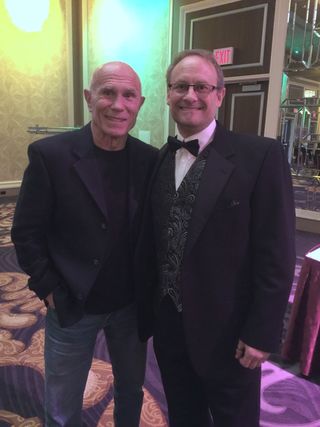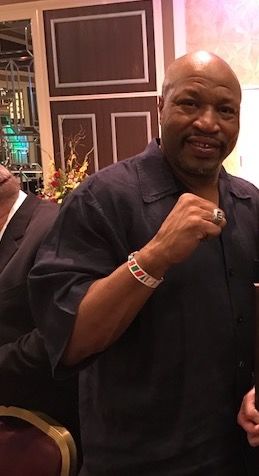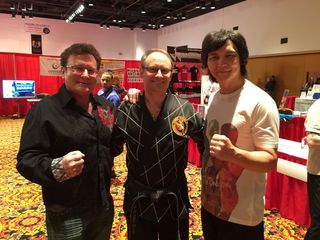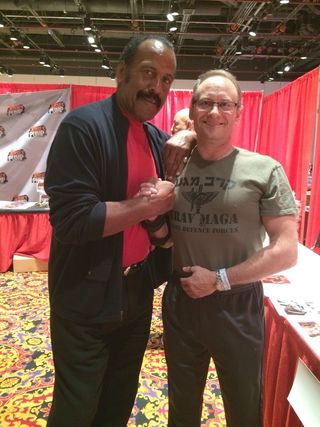In Psychology Using Martial Arts as a Form of Release
I have had several jobs and careers as a physician, researcher, scientist, psychology professor, life coach, hypnotherapist, creative person, and personal trainer. Only start and foremost, I am a martial artist.
My Personal Experience with Martial Arts
At 9 years quondam, I began to study martial arts. Bruce Lee was my hero. The concrete challenges, the strength, flexibility, and excitement over being able to boot above my caput and break boards with my hands was inspiring and motivating. I began in the Japanese arts of Judo, Aikido, Jiu Jitsu and Karate. At twelve years old I started learning Chinese Kung Fu and for my Bar Mitzvah present at 13, my parents signed me upwards for lessons in the Korean arts of Taekwondo and Hapkido. It became an addiction. Initially going three times a week, I gave upward my Hebrew lessons, guitar lessons, and any free time I had, to the point of studying and practicing martial arts 4-5 hours per day, six days per week. It became my goal in life to exist a martial arts instructor. Equally the years went by I continued to add new styles and techniques, such as Thai boxing and Israeli Cocky-Defense.
In university, I studied psychology as many of the concepts had been previously introduced through my martial arts practice. Later medical school and residency, I was able to incorporate lessons learned from martial arts into my careers and integrated positive psychology into a health curriculum which I taught to physicians. I have found a tremendous overlap of martial arts with all other of import aspects of my life. For instance, as an anesthesiologist, I used the Chinese meridians that I learned in martial arts to use acupuncture; treating various pain symptoms. I have taught martial arts from the time I was in high school throughout my career in medicine. Martial arts not but shaped who I am today, but has been the single near positively influencing cistron in my life.
Many of u.s. think of martial arts as something for kids to practice as an after-school activeness and then they focus on discipline, respect, getting good grades, and have an outlet for their ADHD. Merely it tin be then much more than if taken seriously and applied properly.
Kids attend classes and learn proper stances, punches, kicks, exercises, stretches and concrete techniques. Withal, these lessons ordinarily have deeper meanings which are important life lessons. When nosotros larn about the importance of residuum, the kids are practicing standing on one foot and doing a karate child motion, while I am deliberating on the power of achieving balance in my work and personal life, and balance in my need to give and take.
While there are certainly many benefits to participating in other sports and activities like soccer, gymnastics, and tennis, few can come close to the physical, psychological, emotional and spiritual health and wellness benefits that may be derived from serious martial arts practice. Beneath are some benefits of martial arts.
1) Responsibility. This is the first addiction of Stephen Covey's 7 Habits of Highly Effective People and one of the Keys to Achieve success in relationships, business and all aspects of goal-setting. Nosotros are each responsible for our thoughts, feelings, actions, inactions and responses. Without taking responsibility you are unable to truly experience positive growth and transformation to a meliorate self.
Martial arts is a pathway to self-actualization. To not take responsibility is to put a wall in the path. We must exist able to protect ourselves and those whom nosotros love. Nosotros larn that if we don't take responsibleness we may lose the things nigh dear to united states of america. With this knowledge, nosotros become more than enlightened of the words we use and our non-exact advice when faced with conflict. We take command over how we respond to others and whether nosotros choose to escalate or de-escalate conflict, whether we choose to avoid or evade a fight, and the extent of force that we employ to end a disharmonize.
two) Discipline. Attaining and practicing cocky-field of study is a great asset in both our personal and professional lives. Regular practice of martial arts helps us gain the ability to command our emotions, desires and reactions. Martial arts teach us to think before acting, regulate our movements, and focus on activity rather than reaction. The discipline involved in fine tuning and honing skills and techniques cannot be overstated. This ability becomes a way of life and permeates all aspects of our being.
- What Is Positive Psychology?
- Find a therapist near me
3) Perseverance. People with perseverance are more probable able to attain long term goals in the face of adversity. Excelling in martial arts is extremely difficult – information technology takes thousands of hours of practise and dedication encountering many challenges forth the way to developing new skill sets and advancing in belt ranks. Martial artists learn to view challenges as opportunities rather than obstacles; crucial in minimizing unhealthy dis-stress. As Aikido founder Morihei Ueshiba said, "Failure is the key to success; each mistake teaches us something." It is this kind of mental attitude which leads to an enduring and striving spirit. Through challenges nosotros may truly grow and past growing nosotros may best face challenges. Martial arts emphasize that it is not how many times you lot fall downward but the number of times that you lot get upwards that is the best predictor of success.
4) Values. Establishing goals based on your core values infuses them with deeper meaning and energizes you to pursue them passionately. Values fix the course by which goals are established. Living a life based on your values is a foundation for achieving a balanced and satisfying life. Bringing life to your values will bring value to your life! Inherent in martial arts are a certain set of cadre values – respect for others, harmony, balance, spirituality, self-determination, self-protection, and service for others. These common belief systems help establish business firm bonds between fellow martial artists and allow u.s. to thrive in other not-martial art related activities throughout our lives.
Positive Psychology Essential Reads

Me with Globe Champion Superfoot Pecker Wallace
Source: Neil Farber - used with permission
five) Positivity. A focus on positivity and optimism is associated with many health and health benefits including less depression, less substance corruption, greater long-term happiness, ameliorate and more relationships, improved career success, improved immunity, and living a longer life. Martial arts instill many foundational principles of positive psychology such as a focus on personal strengths, flow, positive/productive advice, optimism, resilience and celebrating successes. We must each expect within to become an honest and realistic assessment of our personal strengths and observe the all-time martial art fit. When we are securely engrossed in martial arts we find menses – the sense of purpose and timelessness like being in the zone. Marital artists must be able to notice the glass half full as we turn challenges into opportunities. We celebrate our successes such every bit achieving higher belt levels, hall of fame inductions and customs service awards, without existence overly proud.
6) Humility. Society is embattled with the consequences of more ego, self-centeredness and entitlements. Beingness humble is associated with more effective leadership, more self-control, improved work and bookish performance, less prejudicial beliefs, more kindness and enhanced relationships. Martial arts help u.s.a. appreciate our strengths yet be honest and objective about our limitations, weaknesses, and areas which demand improvement. Even the most successful, virtually famous, and most accomplished martial artists are amazing examples of what information technology ways to show humility.
7) Confidence. A lack of self-confidence has devastating consequences for children and adults leading to avoiding social interactions, inappropriate fears, poor relationships, poor chore performance, depression, and substance abuse. With poor self-esteem, you are more likely to give up on goals in the face of arduousness. Marital arts excel at promoting self-conviction and self-esteem in its practitioners. By teaching respect for others, including your opponents while instilling the importance of private responsibility, martial arts promotes remainder betwixt humility and conviction. There are countless opportunities for achieving goals and developing self-confidence.
8) Respect. Having respect for others improves all of your relationships. Respect begets respect. Showing respect and appreciation of others encourages them to respect y'all and increases the likelihood of having others be kind to yous. Respect includes friends, foes, and strangers. Employees report that the single most important trait that a leader can possess is that of respect for their workers. In martial arts non just do we respect our teachers, mentors and those wearing a higher belt, only we also larn quickly to respect our opponents. This trait is important to not get cocky and make unsafe assumptions almost their abilities.
9) Goal Setting. Setting goals provides direction in life, helps clarify your personal mission and controlling. It gives you a defined focus on what is truly of import and allows more control of your time to come journey; helping y'all anticipate and prepare for future challenges. Setting goals is motivating and inspiring. Every bit described in my domino theory of goal-setting, there are many dominos on the road to becoming an accomplished martial artist. Your goal may involve earning a higher level belt, achieving a black belt, beating your personal best for number of forcefulness exercises or stretching further than yous've ever stretched before. The number and variety of goals are endless and the bulldoze, motivation and sense of accomplishment achieved in martial arts is awe-inspiring and can easily be practical to all other aspects of your life.
10) Flexibility. Maintaining concrete flexibility is important for many reasons including increased blood circulation and free energy levels. Greater muscular coordination, less muscle tension and increased range of movement decreases the chance of injury and back pain. Similarly, being flexible in your thinking reduces the risk of psychological injury in the class of stress, depression, and acrimony. Martial arts teach u.s. to be stiff yet flexible. Fix goals nevertheless exist amenable to altering your path based on new circumstances and information. Embracing change is necessary for success in the workplace. With the appearance of new technologies and changing markets, flexibility drives innovation and creates dizzying opportunities. In relationships at home, at work, at schoolhouse, or at play, we must remain flexible and cover the dynamics of any state of affairs to fully capeesh and benefit from the new consequences which are inevitable. This we learn through martial arts practise.
11) Balance. Balance training improves joint mobility, decreases injuries and falls, improves control over and awareness of ane'due south torso position, enhances overall sport performance, reaction time, strength, power and agility and even enhance cognitive memory abilities. We strive for remainder in work and personal life, daily schedules, or psychological balance; not being too bored or as well overstimulated, not too carefree or too uptight, not too stingy or too spendthrift, non too trusting or too suspicious, not too daredevil or too fearful, not too cautious or also outgoing, non likewise introvert or also extrovert. We may get off residue every bit we strive toward a single focused goal. The ability to recognize this and make necessary adjustments are important. Marital arts focus on the physical aspects of balance training only also the mental, psychological and spiritual aspects. If you are physically besides focused on pushing forwards, one has simply to deflect your energy and step sideways to help you lose your balance. Similarly, if you are mentally too focused on pushing forward in an argument, you may not exist open to new information, lose respect and injure your status in a relationship.

Ray Mercer - World and Olympic Champion Boxer and Martial artist
Source: Neil Farber - used with permission
12) Piece of work ethic. Success takes work; physical work, mental work, preparedness, and often spiritual piece of work. Truthful achievement takes fortitude, action and sweat. Martial arts training forms the foundational base for establishing a healthy work ethic. You could become online and buy a blackness chugalug just the initial satisfaction of seeing it hanging on your wall would quickly fade when the realization sets in that this was not earned. I aspect the piece of work ethic I learned through martial arts to my successes in the medical and academic globe. Not being satisfied with getting by, we strive for excellence. Every bit Bruce Lee said, "I fright non the man who has practiced 10,000 kicks in one case, but I fear the man who has practiced one kicking 10,000 times."
13) Wisdom. We tend to lump all martial arts styles under the umbrella "martial arts." Martial arts reflect the people, culture, weapons, and specific circumstances of their countries of origin. These differences are reflected in how they emphasize stances, kicks, punches, blocks, and body movements. Condign an accomplished martial artist requires more than merely learning the concrete techniques. One must understand the history, culture, people, and even the language. Mastering a specific martial art necessitates practicing enough to incorporate techniques into muscle memory every bit well as a deeper agreement about proper body mechanics, kinesthesiology, beefcake and physiology, situational sensation, conflict management, de-escalation techniques and peradventure weaponry including materials and manufacturing technology. I have been fortunate in being able to employ knowledge gained through martial arts in my travels to the far east and in building positive productive relationships with people from a multifariousness of cultures. A quote frequently attributed to Bruce Lee is "Earlier I learned the art a dial was just a punch and a kick simply a kicking. Later on I learned the fine art, a dial was no longer a punch and a boot no longer a kick. Now that I sympathize the art, a punch is just a punch and a boot simply a boot." This is the mastery effect; associated with high self-efficacy and enhanced operation.
fourteen) Courage. Interim appropriately in the face of arduousness without overconfidence or inappropriate fear. Courage is of import for those with families and friends whom they care to protect. It enforces personal boundaries, enhances self-confidence and has the power to strengthen teamwork. Backbone is a trait strongly nurtured by martial arts do. Even for those with a predilection to exist guided by fear, visualizing and undergoing repetitive, stressful, realistic self-defense drills helps 1 develop the necessary courage to face up fears – both physical and psychologic. We learn martial arts not and then we tin can hurt those in front of u.s.a. merely to protect those whom we honey standing behind us.
15) Creativity. Inventiveness relieves stress and promotes overall health and wellness. Information technology improves mood and overall emotional wellness, enhances brain office, promotes the production of new neurons, and may even help prevent Alzheimer'due south. True practice of martial arts goes well beyond planned patterns. Only following such patterns is to take away one'south freedom and falsely lead to the belief that the blueprint accurately represents reality. Martial arts promote creativity in i's approach to novel situations; thinking out of the box and using a dynamic approach to apply and develop new techniques or use old techniques in new ways. This is why so many martial artists exemplify the term "artist". They are actors, painters, sculptors, dancers, and musicians who are able to utilize this creative code to other aspects of life.
16) Leadership. Leaders set management, create visions, inspire and motivate others, forge teams and create productive organizations. Leadership involves valuing and respecting others and knowing their strengths, thinking out of the box, looking at obstacles every bit opportunities and taking responsibleness for their decisions. Martial arts encourage a leadership frame of heed – a mindset of improving our community and improving the globe. Information technology starts with a dream nigh what could exist, visualizing how this volition be and taking action to go far happen. Implicit in this framework is the cocky-conviction, responsibility and belief that i can make a positive difference. The accent in martial arts on effective advice, respect for allies and foes, presenting a respectable appearance, striving for self-improvement, showing humility and taking activity fosters constructive leadership qualities.

Me with Dr. Bob - Grandmaster of Success, World Course martial artist and Don "The Dragon" Wilson - Histrion and World Champion martial artist
Source: Neil Farber - used with permission
17) Open-Mindedness. Existence open-minded is only possible if you presume that yous don't have all of the information. This is an essential trait for success in relationships, in business, and in acquiring or advancing in whatever sport, hobby, or activity. This can be difficult when the new data counters our long-held beliefs. However, the payoff is well worth information technology as we gain valuable new cognition, become stronger, more confident and acquire to change our mistakes into life lessons for success. The martial arts chief pours tea into an already full cup and the tea overflows onto the table and floor. The student says, "what the heck?" The master says, "Like this loving cup you are so full of ideas that you tin't agree onto annihilation new. You lot must first empty your cup to exist able to gain new knowledge." Every bit one of my instructors, Avi Nardia often states, "Sometimes a teacher, always a student." An effective martial arts practice is dynamic wherein the martial artist must exist open to new information to fairly respond with appropriate counters.

Me with Grandmaster John Pellegrini - Founder of Gainsay Hapkido
Source: Neil Farber - used with permission
18) Mindfulness. An open up, nonjudgmental moment-by-moment awareness of your thoughts, feelings, bodily sensations and surrounding surroundings. A focus on the hereafter is to live in a dream and a focus on the past is to alive in a retentiveness. Mindfulness is a focus on the here and now. It is associated with improved wellness and wellness, lower stress, meliorate conclusion-making, less errors, an improved immune system, better relationships and greater life satisfaction! It gives us a greater sense of mental clarity and focus. Mindfulness is a key ingredient of martial arts practice. More just existence aware of what is going on; there is an implicit deeper sense of spiritual contemplation and reflection. As Harvard Psychology Professor Ellen Langer has described, mindfulness is the process of actively noticing new things, relinquishing preconceived mindsets and acting on the new observations. As in Buddhism, where mindfulness originated, martial arts helps u.s. focus on our breath to ballast our thoughts. To excel in martial arts one must commit to being fully present in the now. Distractions of past recollections or time to come predictions may be life threatening.

Me with Cynthia Rothrock - Actress and Earth Champion Martial Creative person
Source: Neil Farber - used with permission
xix) Situational Awareness. Being warning to what is happening around you lot and understanding how certain situations, physical objects, events, and deportment may affect outcomes. Situational sensation involves having a level of emotional and social intelligence to perceive and adequately interpret non-verbal information. A lack of this awareness is a primary contributor to accidents caused by human fault. In martial arts it is necessary to be able to incorporate this information analytically with other input to fully assess your situation and avoid placing yourself in dangerous predicaments. The concept of situational awareness can be traced back to Sun Tzu's The Art of War from the 5th Century BC. Bruce Lee called this "the fine art of fighting without fighting." The art of exact de-escalation, anticipation, and appropriate avoidance; the fashion of the peaceful warrior. We learn to fight then that nosotros don't have to.

Me with Fred Williamson - Thespian, Producer, Football Star and Martial artist
Source: Neil Farber - used with permission
xx) Action. Activity separates dreaming from doing; taking an active office in your destiny is one of the keys to success, not leaving your futurity to the universe and hoping things get better. Action arising out of your principles, energized by visualizing your goals and the path to getting there will be deep-seated, meaningful and inspired. Thinking most changing the world in a positive way is adept, talking near it is slap-up, doing it is best! Martial arts is non just a way of being, information technology is a fashion of doing. Nosotros acquire to control our bodily movements with precision as we gain an understanding of how minute movements may have tremendous consequences such as during pressure point application or joint manipulations. Nosotros capeesh that in all aspects of life we take a personal responsibility to have inspired action. A Japanese Maxim says, "In the struggle between the stone and h2o, in time, the water wins." The stone may seem stronger but information technology just sits there as the water takes action.
I am hugely and eternally grateful of the opportunities afforded me by virtue of my involvement in the martial arts world. The positive psychology lessons, the health and wellness benefits and the powerful influences of beingness able to interact with amazing individuals who embody the truthful spirit of what it means to be a martial artist.
- Follow me on Twitter and on instagram@thekeytoachieve
- Like my Facebook page, "The Key to Achieve"
Source: https://www.psychologytoday.com/us/blog/the-blame-game/201712/positive-psychology-in-martial-arts
0 Response to "In Psychology Using Martial Arts as a Form of Release"
Post a Comment